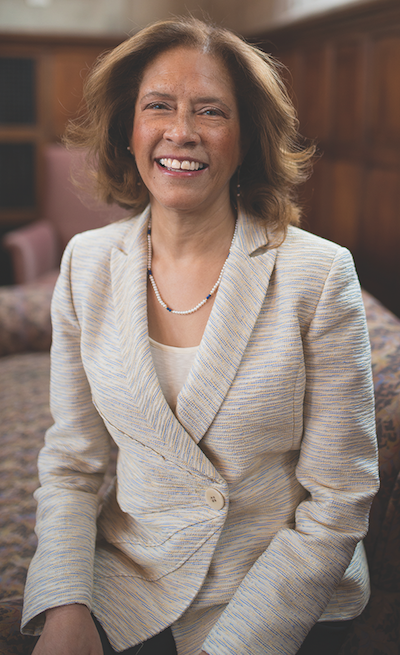The confidence in Georgette Chapman Phillips’ voice as she speaks about her new position leaves little room for doubt. The new dean of Lehigh University’s College of Business and Economics is eager to write the next chapter in the college’s history.
Be that as it may, her departure from Wharton where she served as vice dean is bitter sweet, she says. After 22 years, friends and colleagues top the list of things she’ll miss most. “Penn is the only university I’ve ever worked for. I have a colleague whose son and my son went through potty training together.”
Potty training isn’t the only thing Phillips conquered while working at Wharton. She joined the University of Pennsylvania in 1992 as an assistant professor, steadily rising through the ranks as associate professor with tenure, chair of the real estate department, vice dean of Wharton’s undergraduate division, and vice dean for technology enhanced learning.
Her achievements included creating and implementing a cross-university series, increasing the number of female and minority students at Wharton, launching a new academic concentration in social impact and responsibility, expanding international learning programs, cultivating major gifts as part of the university’s $4.3 billion campaign, and receiving two teaching awards at the undergraduate level.
As she leaves behind an impressive trail of success, it is Phillips’ hope that her lasting legacy is a continuous pursuit to make Penn—not just Wharton—the best possible educational experience for all students.
FIRST ORDER OF BUSINESS: ‘SCORE A BATHROOM KEY’
With this in mind, Dean Phillips—who became Lehigh’s first female and first African-American business dean on July 1—insists that the decision to cut ties with Wharton was a pull and not a push. A decision she weighed heavily, but ultimately concluded that it was time for new beginnings at Lehigh.
Her first order of business? That’s easy. “Score a bathroom key.” Laughing, she tells Poets&Quants about the time she went to Lehigh’s campus for some pre-work, only to find herself in an unexpected pickle when she couldn’t get in the restroom after 5 p.m..
Once the bathroom key has been fully secured, her key focus is faculty. Her early agenda is to begin meeting all 79 business professors one by one, probing and gathering their input on the future direction for the college. During the late summer she is planning an off-site, day-and-a-half retreat for department chairs and other senior leaders to hammer out where the school is headed.
‘I WANT LEHIGH TO BREAK AWAY FROM THE PELOTON’
Having been in the job only a few days, Phillips is understandably hesitant to plant a stake in the ground and say what her flagship initiative will be, but she does reveal what she calls a “meta-goal” and that’s to raise the public visibility of the school/broaden its public platform. This was one of the main attractions that drew her to Lehigh.
“The previous dean hired some incredible faculty. Combine this with the impressive lineup of professors who were already there, an extraordinarily strong student population, and a very dedicated staff; I saw a huge reservoir of untapped potential.”
Put simply, “Lehigh is a really great school that flies under the radar,” Phillips says.
Compared to Wharton’s top 10 ranking by Bloomberg BusinessWeek for both its undergraduate and full-time MBA programs, Lehigh’s undergraduate business program is currently ranked 31st and its part-time MBA program is ranked 12th.
Phillips, an adventurer who enjoys hiking, kayaking, whitewater rafting, and mountain climbing (she recently climbed her way to the top of Mount Kilimanjaro), uses a cycling term to further illustrate her vision. “I want Lehigh to break away from the peloton and move to the front of the race.”
As far as teaching and research goes, the new dean plans to devote full time to her new role and eventually apply her research in urban and regional planning by studying the city of Bethlehem.












Questions about this article? Email us or leave a comment below.